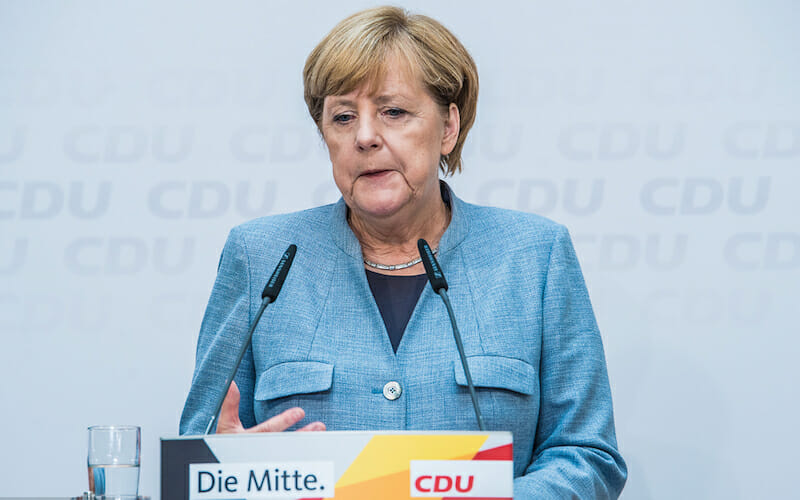
Merkel and the Fault Lines of Germany’s Leadership Succession
It is not usually news when members of a conservative party stress that their party is conservative. However, in Merkel’s Germany things are slightly different. The German chancellor has moved her party to the left since she came to power in 2005. But criticism of her handling of the 2015 refugee crisis and the disappointing results of her centre-right Christian Democratic Union (CDU) in the 2017 general election have weakened her position within the party. It is now commonly assumed that this will be her last term and she will not run again in 2021, when the next election is expected to be held. The question of who will succeed her has been posed and the recent meeting of the rather insignificant Werteunion, a small circle of right of centre conservatives within the CDU, is telling for the fault lines that shape the race of who will succeed the once seemingly all-powerful German chancellor.
The meeting of the Werteunion last Saturday in the small and idyllic South German city of Schwetzingen assembled merely 100 party functionaries of secondary importance. No CDU front bencher was present and normally the meeting would have been banned to the back pages of the Sunday editions at best. But significantly the unofficial spokesperson of Germany’s Christian-Democratic Merkel-critics, Jens Spahn, sent a letter that was read at the meeting’s introduction to great applause. Spahn is Germany’s new minister of health and over the last few years has styled himself as the young, conservative alternative to Merkel – much to the chancellor’s chagrin. His message was clear – here is a group of people that wants to move the CDU towards a right-wing position and I support that idea! Thus, the meeting made it into the evening news instead.
On the other side of the party-internal division line is Annegret Kramp Karrenbauer. Merkel recently appointed her party secretary, her right-hand woman in running the CDU. The overall interpretation of this move was that Merkel had tipped Kramp-Karrenbauer, often only called AKK due to her complicated and long name, as her natural successor. AKK did not visit the meeting of the Werteunion, nor did she send them a letter of warm words to be read out. On the contrary: she has always been a supporter of Merkel’s decision to stress that the centre-right CDU is more centre than right: Die Mitte, “The Centre,” is the CDU’s official slogan since 2007. Aware of the need to address criticism of this strategy, Kramp-Karrenbauer’s first move as party secretary was to announce a thorough debate on the party’s programme, with the ultimate goal to rewrite it entirely over the coming years. Thus, while she stated that the Werteunion had a place within the CDU, she demanded that they voice their demands within the debating process over the next few years. Debate yes, but on my terms, was her message.
It is unclear who will ultimately make the race to succeed Merkel. Spahn is young, conservative, witty and telegenic. He would most likely follow a more hard-line course on immigration and stress traditional values such as family and maybe nationalism as party leader. Kramp-Karrenbauer is less polarising, enjoys the chancellor’s support and is more experienced than Spahn. She was Prime Minister (Ministerpräsidentin) of the small federal state Saarland from 2011 to 2018 where she won two elections convincingly and governed with two different coalitions – first a Jamaica coalition with the Green party and liberals (a constellation that just failed on federal lever) and then a Grand Coalition with the Social Democrats which is track record of success that hardly anyone in the CDU can muster. Her course might be close to what Merkel has been demonstrating in the past few years – moderated, centrist, cautiously pro-European.
Right now, it is almost impossible to tell who will succeed Merkel either as chancellor or as party leader. But the topic matters as for the last 13 years the person leading the world’s third largest economy has come out of the ranks of the CDU and polls do not point to this changing any time soon. In a way it was a stroke of genius by Merkel to make her critic, Spahn, a minister in her cabinet and at the same time positioning a potential successor of her liking in AKK near the party leadership. Keep your friends close and your enemies closer, Merkel seems to think. Right now, fighting Spahn is as much AKK’s task as it is hers and if she succeeds AKK would be chancellor more to her own efforts than just by Merkel’s grace. If Kramp-Karrenbauer fails, however, Spahn will actually have deserved the post of chancellor and it will be less of a stain on Merkel’s legacy. Although it doesn’t seem like Merkel cares too much about that. But if Spahn really makes the race, a more conservative centre-right party in Germany would not be news for long, and Merkel most certainly would be less pleased.

